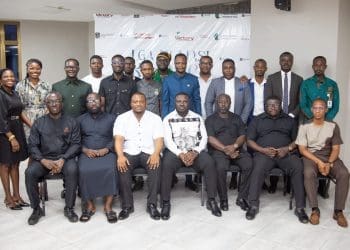Despite several policies and programmes aimed at promoting access and quality in basic education, pupils at Yapei Presby Primary school in Central Gonja District of the Savannah Region, are still facing significant challenges.
Inadequate furniture at the school has forced pupils to either sit or lie on the bare floor to read and write, causing discomfort, and back pain, and gradually affecting their academic performance.
Many pupils are seen lying on their bellies to write, while others have improvised seats using blocks and stones.
The upper primary level faces a similar situation, with no major infrastructural expansion or supply of logistics despite the increasing population.

Yapei Presby Primary has two blocks, A and B, which have a 340 and 319 student population, respectively.
John Fuseini, PTA and SMC chairman, has voiced serious concerns over the ongoing school infrastructure challenges that have plagued the institution for years. Speaking about the deteriorating state of education in the community, he noted that although some residents have shown concern by providing support and assistance to the school, the situation has become unbearable.
“We have been battling with this situation for a very long time, and some residents have shown concern by providing and assisting the school, but the situation is now unbearable,” Fuseini said.
Highlighting the education crisis, he added that the school is currently facing a significant lack of teachers, which is severely impacting teaching and learning activities.
“Our school lacks teachers, furniture. It also needs renovation. Indeed last three years, we did our best as PTA, but it wasn’t enough,” he said.
Despite the efforts of the Parent-Teacher Association and community support for education, the challenges continue to hinder academic progress. Urgent action is needed to address the shortage of teaching staff, classroom furniture, and much-needed renovations.
In 2024, data from the Ministry of Education’s (MoE) Education Management Information System (EMIS) indicates that as of 2021, a significant portion of basic school pupils lacked seating and writing places: 50 percent of KG pupils (596,949), 40 percent of primary pupils (1,308,479), and 30 percent of JHS pupils (425,465).
This totals to 2,330,893 pupils, representing 40 percent of basic school students.
The management of the school reports that this situation is adversely affecting the quality of teaching and learning. Nationally, there is a desk shortage of 40 percent, with the northern regions of Ghana—Savannah, Northern, North-East, Upper West, Upper East, Bono East, and Oti—experiencing even higher ratios.













